Drove 550 km (round trip) from Shanghai to Lin An near Hangzhou (45km away) and visied the Mt. West Tian Mu. I took some pictures of the bamboo wood there.

© Jian Shuo Wang

© Jian Shuo Wang

© Jian Shuo Wang

© Jian Shuo Wang

© Jian Shuo Wang
Drove 550 km (round trip) from Shanghai to Lin An near Hangzhou (45km away) and visied the Mt. West Tian Mu. I took some pictures of the bamboo wood there.

© Jian Shuo Wang

© Jian Shuo Wang

© Jian Shuo Wang

© Jian Shuo Wang

© Jian Shuo Wang
Good news. The new Metro Line M7 Bowen Road (博文路) Station has started construction. The construction site has been cleared and the west lanes of the Jin Xiu Road has been switched to the other side of the road to give way to the construction site. The workers are migrating the electronic cables to allow futhure construction of the Metro Line #7. It is said the whole line will start to construct at the begining next year and will be completed by the year of 2008 or 2009.
Credit: Anonymous
It is very good news for me. My Pudong apartment is 7 minutes away from this station. The M7 will goes from this station to the east and connect to the Maglev. To the west, it will first go through the Shanghai Expro 2004 site and goes to Puxi near Xujiahui.
OOB Tomorrow
I will drive to Lin An, a small town west of Hangzhou tomorrow with Wendy, my father, Wang Chen and his girl friend Zhao Xia. It is about 4 hours away from Shanghai and I need to arrive Hangzhou first and the head to west. The winter is coming. Wendy thought of the idea to go outing before it is too cold to go out.
I saw two workers were preparing to tow a red Santana because it was parked on a street (Xin An Road near the Huaihai Road). Temp parking is not allowed on te street. A policeman was nearby.
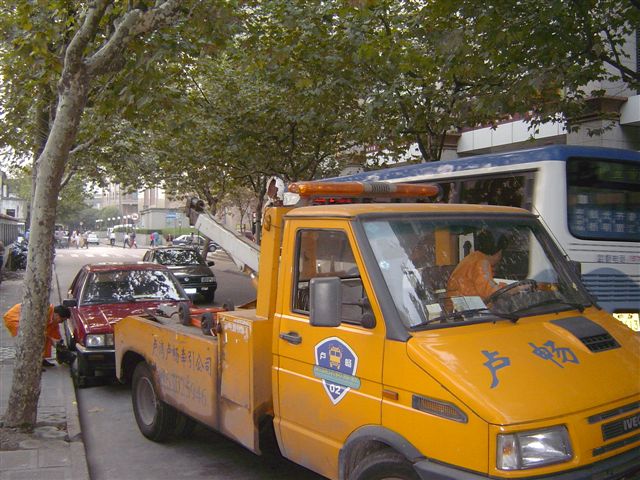
Taken by Jian Shuo Wang
Within 2 minutes, the two workers went back to the trailer. The trailer went away with the roof light flashing. The poor car was towed behind it. The whole things happened within 2 minutes.
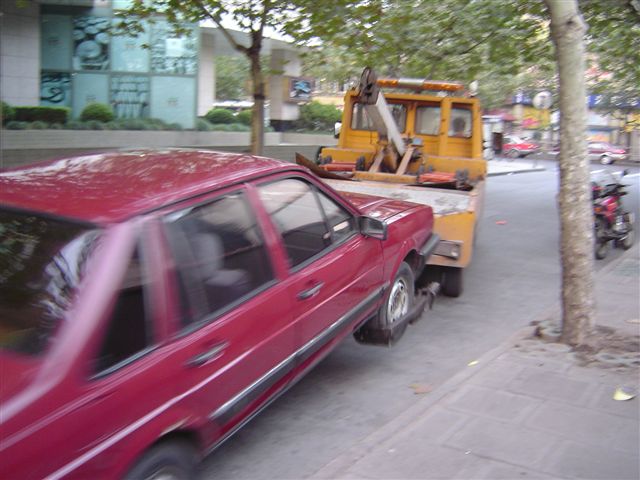
Taken by Jian Shuo Wang
I was so amuzed to see their effecient work. The poor driver have to go to somewhere in the west part of the city (I heard it should be at the Long Wu Road, which is about 15 km away from the location the car was towed and there is no easy way to get there). A 200-RMB ticket should have been waiting for the driver before he/she arrives.
I work near that area now and every noon, when I finish my lunch, I walked by the streets and paid special attention to see if there is free parking lot in the nearby area. I considered parking along the road, but gave up the idea. It seems if I had parked there, my Goudaner would have been towed already.
P.S. BTW, today is BillG’s birthday, according to Scoble.
More typos found:
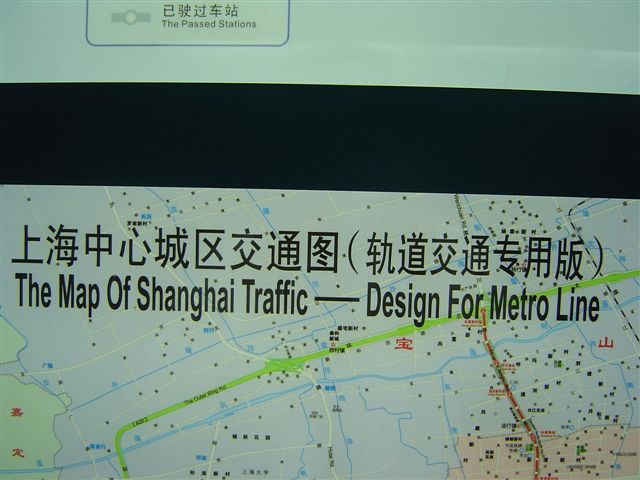
Picture taken by Jian Shuo Wang at Xujiahui Metro Station, Shanghai
“The Map of Shanghai Traffic – Design for Metro Line”
Did they really think that the map is about the traffic instead of the roads and areas? Design should be Designed. Metro Line should be Metro or Shanghai Metro. Actually, I don’t think they should put Designed for Metro Line in so big font.
Rail Transit Line 1 Full Diagram
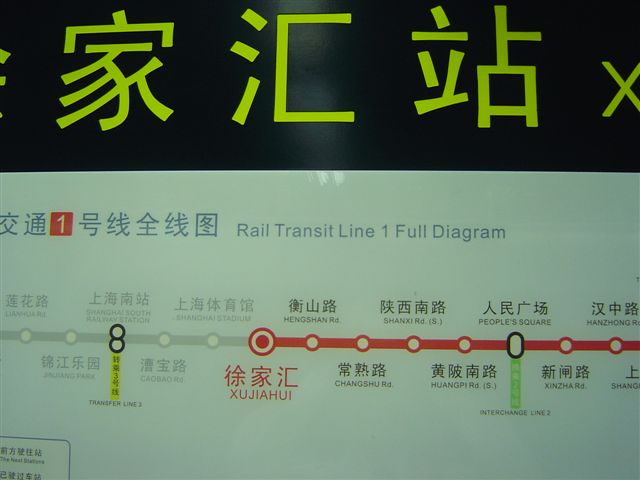
Picture taken by Jian Shuo Wang at Xujiahui Metro Station, Shanghai
This title is insteading.
Shanghai Rail Transit Line No 1
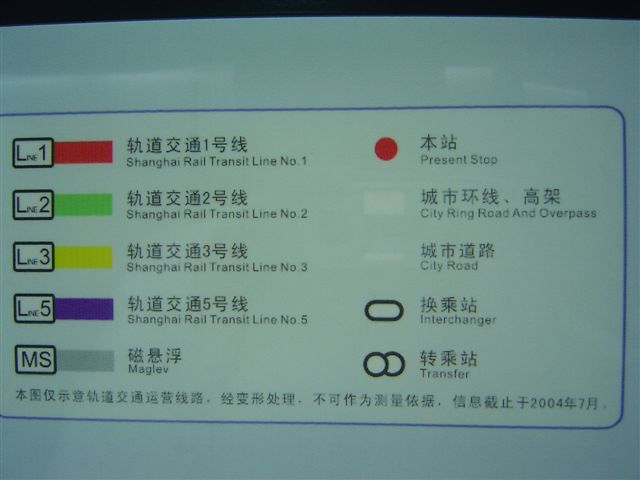
Picture taken by Jian Shuo Wang at Xujiahui Metro Station, Shanghai
I would prefer to call it Metro Line #1 instead of “Rail Transit Line No 1”. Is there a problem here? I am not sure.
Transfer Line 3
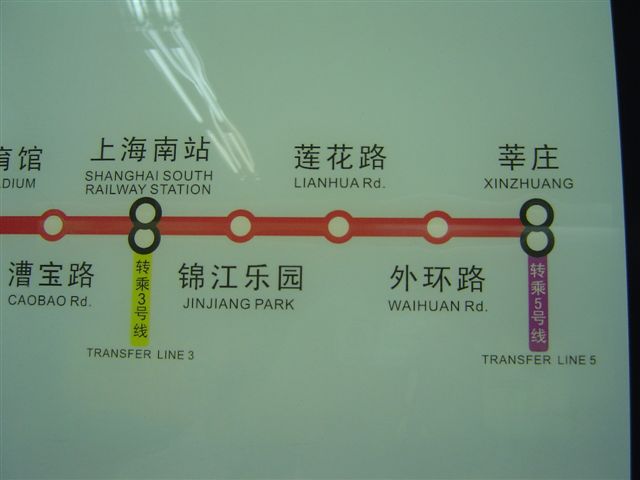
Picture taken by Jian Shuo Wang at Xujiahui Metro Station, Shanghai
The transit station was marked as “Transfer Line 3” and “Transfer Line 5”.
Chinese also has Problems
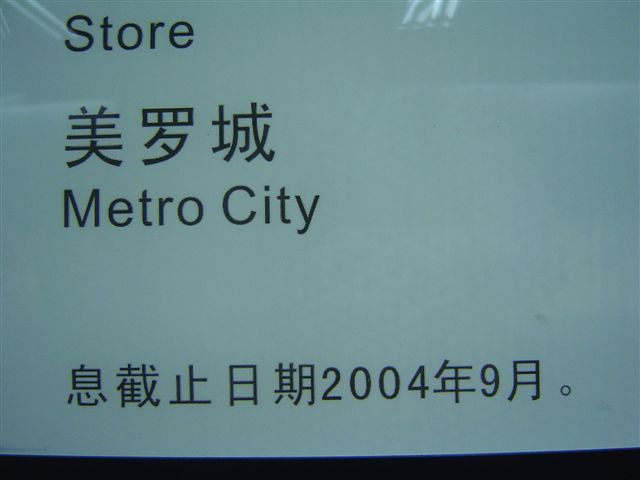
Picture taken by Jian Shuo Wang at Xujiahui Metro Station, Shanghai
There is error not only in English. Here is an exmaple of Chinese mistakes. They ignored Xin 信 in the sentence of Xinxi (Information or 信息).
More and More People Got Involved

Photo submitted by Ou Yuxian
Mr. Ou sent me email to report another suggestion to Shanghai Metro. At every station, there are many boards like this. Mr. Ou said in the mail:
… Here I am attaching a photo they took in a metro stattion. On one board, it says “Danger! Jumping into the tunnel is forbidden”. According to the experience I have, it would be a more proper way to say “Danger! No jumping into the tunnel.”
Thanks Mr. Ou. I have put the picture onto the ShanghaiWiki.MetroTypos page and will hand over the printed version of the page to Metro Corp.
Actually, this version has been much better than the previous one. I remember the older version was:
跳下站台进入隧道。危险!
There was no English in the old version. The translation will be
Jump Off the Platform and Enter the Tunnel. Danger !
That sign was really confusing.
Follow Ups
As Miss Wu, the nice lady from Metro Xujiahui said, she had reported the problem to the management and they will order to correct it. However, I do worry about the quality of the next version without a good sense of English.
Joe became the first contributor to the newly opened My City, My Bus Stop project. Here is the stops/lines he just contributed:
The editing history can be found from the Page History link (example).
Thanks Joe for being the first and the nice description of JiaLiFang .
Following his link on JiaLiFang, I found his interesting blog. Joe seems to be in the same field as Isaac and Zheng. They are all of the style I like – the style of a very passionate learner and a sereious thinker. Joe brought a very good start to the new project. I am going to publish the source of the Wiki so the files can be backed up in many different locations and does not waste people’s effort if the server crashes. I do keep my weekly backup. The old entries contributed by Billy Qiu, Xiao Gao and others’ have been restored to the current base. I believe the baseline of any public service that others can contribute is there is no data lose at any time.
“Winners never quit and quitters never win”. This is what I learnt from two years of blogging. I started some interesting ideas, but it stopped for some reason. Many people have brilliant ideas but not many can stick to with them.
I started the My City, My Bus Stop project in the first week of 2004, but the system failed because of migration to the new server. It involves much work to rebuild the whole thing and it did take some time to rebuild it. My friend Isaac has asked about the status of the project and so have some contributors. Although it took about half a year to fix it, I finally fixed the problem and now everything works. I bet we can start it again – the My City, My Bus Stop Project hasn’t die yet. (These two paragraphs were rewritten according to mc_dean’s suggestion)
Go to My City, My Bus Stop Project (Chinese site)
The Base
The project started with a base of all public transportation lines in a Wiki site. Now there are nearly 400 lines in it already. You can navigate through public transportation lines or see which lines stop at a certain stop. It is very useful for people to find the right bus in the city.
At least, I believe it will become one of the top results for many bus stop names in Google within two months, as the Shanghai Map did. Why? Google loves the intensive cross links in the Wiki site.
What is the Next Step
The power of the Wiki site is that everyone can modify and contribute to the pages. Here is how everyone can participate.
Attach Your Blog to a Bus Stop
If you run a blog, you can put your blog along with your name to the stop that is nearest to you. No matter where you live in the city, there must be a stop that is closest to you. For example, I put my name at TianChi. Maybe you can find a blogger at the same bus stop. It will be fun if you find other bloggers this way.
Describe the Stop
The initial idea behind this project is, by describe the points of the city; we have some idea of the whole city. If you are interested, you can select a bus stop, and describe the bus stop in your own words. You can tell people what is unique in this bus stop that makes it so special within the city.
Correct Errors and Update the Route
There may be errors in the map and you can correct it. There are new bus lines, such as GJ607, that can be added into the system. So help yourself to do it.
How to Participate
If you want to participate in this project, follow the simple steps:
1. Choose a stop. You can follow a bus line to reach your stop.
2. Click “Edit Page” button located on the top-right and/or bottom of the page.
3. Modify the page as you wish. You can find formatting tips at the end of the edit page.
4. Click “Save” to make your change available for others. Yes. No authentication and authorization are implemented so far. This is how Wiki works.
Good luck! This is Your City.
When I am pushing on correction of the misspellings in Shanghai Metro, I hear about debate whether we should put on English signs in Shanghai. For me, there is no doubt that we have to do it. It is interesting to see why people want to pull English signs out of the direction boards.
The Arguments
The following comments are quoted from the thread under Is English Skill That Important, in courtesy of the commenter.
Mark said:
Reading this post made me feel a little sad. I’m from the southwestern part of the US, and I’m really interested in foreign languages. I grew up with Spanish around (since more than 15% of the people in my state speak Spanish, not English at home). Later, I studied Japanese in college.
Anyway, my experience with Chinese has been terrible. As I grew up I really loved Chinese culture, Chinese movies, Chinese food, etc… My school didn’t offer Chinese language classes, but after I graduated from college I moved to Taiwan, hoping to learn Chinese. After moving here, I’ve been taking Chinese classes at Shifandaxue for nearly a year. The classes are ok, and my reading is improving, but I’m learning almost NOTHING from daily life!
Why? It’s because Taiwanese are so f#$@ing obsessed with English, that as soon as they see a foreign-looking (i.e. WHITE) guy, they use English. Even though I gave up my job, and traveled 10,000 miles from home, I still can’t have a Chinese language environment, and it’s all because of how crazy they are about English. I guess there’s a racial element too. I have an ABC friend who speaks much worse Chinese than me, but nobody pushes her to switch to English when they talk with her. People don’t even know where I’m from, they just see the color of my skin and then assume I MUST speak English. I’d give anything just to be able to find a place where people would just speak to me in Chinese (even if my Chinese is only so-so).
One last thing I’ve thought of… English is actually only the world’s 3rd most spoken langague, according to ethnologue.com
#3 English 470,000,000 speakers
#2 Spanish 490,000,000 speakers
#1 Mandarin 1,200,000,000 speakers
Look at that. 60 years ago, French was considered the world langauge of diplomacy. Now, it’s become English. If China ever becomes a rich country, I think I know what langauge will be dominant 60 years from now…
Posted by: Mark on January 16, 2004 11:19 AM
Nick added:
I work for Pearson Education the largest English Language Publisher in the world. I have been to Shanghai to bring english teaching software to Mainland China. My opinions maybe biased however I feel strongly:
You can learn other languages without losing your culture. China has been around a long time and the culture has remained in tact. I think people confuse american cultural invasion with the fact that people everywhere want prosperity they want cars, nice homes, good life. Having more prosperity is not an inport of america. We have a developed country and we have all these things. One hundred years or more Europe was the envy and Britain was the ideal before that it was France.
English is not the world language because of america. Britain established english in many places of the world during the colonial period. Post WWII American economy and business dealings made English the language of business and commerce. Now English is taught pretty much as a second language. Why?
English is simply an easy language to learn. I know many people in Shanghai who are self taught. Something that would be almost impossible with Mandarin. Because of the tonal qualities of Chinese, Japanese and other asian languages it makes it very hard for europeans and americans to speak these languages properly. The romance languages like english, spanish, french etc are very similiar so they can pick up english quickly and we share a common alphabet. The written languages of asia especially china are not aligned with the spoken language making it even more difficult.
In asia in particular there are so many numerous dialects which are so different they are like a foreign language to each other. Take cantonese versus mandarin. As stated above english is a simple common format for everyone to be able to communicate with.
Does knowing english give you a better life in China. The answer depends on the person. It definitely gives you better work opportunities but its up to the person to seek those opportunities out. This would be especially true in areas where people interface with people in other countries like the big costal cities etc.
History has shown people borrow from each other’s cultures. I dont thing there is a need to worry the Chinese will all become Americans like some of the phobic comments made above. I do believe that there are many misperceptions about China in the states and in China about America. The bottom line is the more people can communicate with each other the better off we will all be and the safer the world will be.
Posted by: Nick on July 25, 2003 07:46 AM
Anna’s oppion:
Great website! I was looking for info about PUDONG and stumbled upon it. Wonderful information and thanks for being so kind and friendly! As for learning English, it does help open up doors of communication of others. I do think it is important to have your own dialect/language as well. I can’t speak my mom’s dialect but I understand it and Mandarin/Cantonese. I studied Japanese, Vietnamese and Spanish (but I am able to do small talk at best with the others). I believe communication with others is vital for international understanding but “when in rome, do what romans do” I do agree. Or at least have people aware of this. Just my small two cents worth.
Posted by: Anna on September 3, 2004 03:27 AM
Geno’s long arguement that English should NOT be the world language
Dear Nick,
No offense here, but I have to disagree with just about everything in your post. I’m a Korean-American who’s traveled thru much of the world, both as my parents moved around and on my own for business and vacation. If there’s one thing I’ve learned with certainty, it’s that this claim that people utter all the time– that “English is the international language of business, pop culture, diplomacy, and just about everything else”– is totally false. TOTALLY BOGUS. In fact, the more I hear this myth about English taking over the world, the more I become convinced that it’s a thinly veiled attempt at commercial imperialism by the USA and UK, a way to pry loose and ruin longstanding business relationships that many non-English speaking countries have with each other so as to draw them into the commercial sphere of the US, UK, and other English-speaking countries. Oh, and also to force the poorer countries of the world to bear the cost of language-learning and translation, so that the US in particular gets to boost its profit margin even higher. English is popular as an international language but not nearly to the extent that people play it up, yet USAers in particular repeat this lie so often that many people become duped into believing that it’s a truth, to the advantage of USA companies and at the expense of home-grown firms.
I heard a story on the radio recently about an American businessman– Jeffrey Jones– who’s actually pushing hard to make English the official language of South Korea, claiming that he’s acting benevolently in Korea’s self-interest and increasing their national wealth. It made my blood boil to hear this carpetbagging jerk from the USA try to push something that would essentially ruin my country’s ancient culture and split us from our own history, and even more angry that there are apparently enough gullible idiots in the Korean government and school system to help this guy along. Look, I’m all for Koreans doing the English-immersion programs and improving their command of English (and other languages too), but I’m disgusted by this misguided infatuation with the language.
I for one think that Koreans would benefit more by learning Japanese and Mandarin, since these are the two countries that Koreans will predominantly be doing business with. China particularly will be very powerful and in 20 years Mandarin may be even more important than English both on the Asian Pacific coast and worldwide, so it would be foolish to get obsessed with English as a foreign language at the expense of Mandarin. Nick, you yourself point out that French used to be the ideal language, which goes to show that “world languages” change over all the time, and we shouldn’t get caught up in the fad of the moment. I spent a good deal of time in various countries of Europe, and while there are a lot of people who can speak good English there, English isn’t nearly as much of a common standard as a lot of people pretend. In most of southern and southeastern Europe, places like Italy, Romania, and Greece, they tend to use French as the lingua franca, not English. In most of northern and eastern Europe, in Scandinavia, the Netherlands, Poland, Slovakia, Lithuania, Finland, Estonia, and many of the other former Soviet Republics, German is the lingua franca much more than English. Some of the best German literature and movies these days come from Eastern Europe! German is also the main second language in Serbia, Croatia, Turkey, and some other places farther away from Germany because of all the immigrant and business contacts between Germany and those countries. In much of Central Asia and some other former Soviet republics, Russian is still a lingua franca. (And a lot of Russians speak perfect German and French and actively use them, again with a lot of Russian immigrants going to France and Germany recently.) In North Africa and sub-Saharan Africa, French is more of a lingua franca than English, and in East Africa it’s Swahili. In India English is not widely spoken– I’ve been to India and while some elites do speak it, Tamil is a sort-of lingua franca for the south while Hindi is the lingua franca for the north and center. (I’ve actually seen statistics showing that Hindi is spoken by millions more people than English, and in a lot of different countries.) Spanish is the lingua franca for Latin America. The point being that in the EU French and German are both shaping up as important lingua francas, with Russian, Swahili, Hindi, and Spanish having that role elsewhere, and probably Mandarin soon in East Asia.
Nick, you claimed that “English is not the world language because of america. Britain established english in many places of the world during the colonial period.” That’s totally wrong. In the vast majority of places that Britain ruled, they are not using English as their principal or official language. In Singapore English is co-official, it’s also co-official in African countries like South Africa and Zimbabwe (though not very widely spoken), and of course English is used in the white settler colonies like Australia, but in most former Brit colonies they’ve switched back to their indigenous languages. In Burma, Malaysia and Pakistan for example they may use English at times as a second-language but English is definitely not the main language used. As I pointed out in India, Hindi is official and Hindi and Tamil share lingua franca status in different regions of the country. Up to the fall of the British Empire after World War 2, English wasn’t very widely used, and so the popularity of English today is entirely a result of the US, American business, military and pop culture particularly. If US gets weak for whatever reason, English won’t be nearly as widespread.
Nick, you also claim that “English is simply an easy language to learn.” This is simply outrageous and totally wrong. I’ve talked to a lot of Japanese and Koreans who say that English is extremely difficult to learn– in fact, most Japanese and Koreans say that German is a lot easier since they have similar grammar structure. English has a totally nonsensical spelling and difficult pronunciation, plus it has some very complicated grammar in many places, and vocabulary that’s all over the place. Asian languages by contrast (particularly Chinese) have very simple grammar, no tenses or weird changes of verbs, nouns, or pronouns, plus a rich but easy-to-learn vocabulary.
You go on to say that “I know many people in Shanghai who are self taught (in English). Something that would be almost impossible with Mandarin. Because of the tonal qualities of Chinese, Japanese and other asian languages it makes it very hard for europeans and americans to speak these languages properly.” Again, totally false. I know a large number of Americans who can speak fluent Chinese, Japanese and Korean and who in some cases are self-taught (usually spent some time in East Asia too of course to get fluent). Some Americans and Europeans have studied many foreign languages, and they’ve told me that Chinese is actually the easiest of all to learn because of the very simple grammar and easy-to-learn vocabulary. They’re not bothered by the tones nearly as much as you think. It’s unfamiliar at first but you get used to it. Remember that tones aren’t in Korean either, but lots of Koreans and Korean-Americans learn Chinese dialects, and it’s not too hard to do it.
You also say that “The romance languages like english, spanish, french etc are very similiar so they can pick up english quickly and we share a common alphabet. The written languages of asia especially china are not aligned with the spoken language making it even more difficult.” First of all Nick, English is not a Romance language, it’s a Germanic language. Second, Chinese written language is aligned with the spoken language (each character consists of a phonetic as well as a meaning radical), and if anything the Chinese written system actually makes it a lot easier for Asian countries to communicate with each other, since they can use the writing even if they don’t speak each other’s language. It does take some years to master the writing but again, it’s not as hard as you make it out to be. Most of the characters are pretty unique and it’s not too tough to learn them and tell them apart. In addition for many purposes both native and non-native Chinese speakers just use pinyin Romanization of Chinese which is also popular, so Chinese has the advantage that it can be written both with the characters and with the pinyin phonetic romanization, and people understand it.
You say that “In asia in particular there are so many numerous dialects which are so different they are like a foreign language to each other. Take cantonese versus mandarin. As stated above english is a simple common format for everyone to be able to communicate with.” First of all, as someone who’s been to UK and Australia I can tell you that there are many places in those English-speaking countries where an American won’t know what in the world anyone is saying, since the dialect is so strong. Second, why do you assume that English would be a better common format than any of the Asian languages? As far as a common language goes, East Asian countries have a strong historical connection to Chinese culture and language and in fact over 40% of the words in Korean, Japanese, and some other languages come from Chinese originally. Plus the cultural features of Chinese language are a lot closer for us. So it’s much easier for us to use Mandarin as a common language than English there. On the other side of the coin, in many parts of USA we don’t even use English as the main language. In a lot of states, including in California where I grew up and other states that used to be part of Mexico, Spanish is used more than English, and you’d better know it. (In my middle school our teachers all told us that Spanish was the language that everybody had to learn and speak fluently to get ahead.)
The one place where I agree with you is here-“The bottom line is the more people can communicate with each other the better off we will all be and the safer the world will be.” Yes, I agree. But this has to work going both ways. I’m sick of so many of my fellow Americans being so lazy that they expect everybody in foreign countries to speak English to them-they should at least make some effort to learn the main languages of the places they visit. I think it’s fine that people in Asia and Europe learn English-I think it’s also fine and helpful that many of them get fluent in French, German and Hindi too. But in return, we Americans have to stop being so lazy and spoiled about languages ourselves. If more Americans actually made the effort to learn French, German, Spanish, Hindi, Chinese, Swahili, and many other important languages, this would help communication just as much as other countries learning American English. (I’m obviously not saying that every American should learn 10 languages-I’m saying that learning foreign languages should be more valued in general for Americans, and each American should work hard to get fluent in at least one or two foreign languages, the way most Europeans and Asians do.) My parents taught me Korean but I also worked hard to learn Spanish and German at school, and I take a lot of pride in speaking them. In return, people from other countries appreciate it a lot when I speak their languages rather than demanding that they speak mine all the time. Communication goes in two directions, and we Americans need to do more on our side of the bargain. In addition to other advantages, it would also help Americans to stop being so narrow-minded. A lot of our stupid foreign policy mistakes and arrogant actions recently are probably the result of a self-centeredness, the fact that many Americans think the world revolves around them. We’ll help ourselves as well as the rest of the world by breaking out of this.
Posted by: Geno on September 29, 2004 04:23 PM
Kwong blamed why an American came to Shanghai for 5 years but didn’t show effort to learn the language.
Geno,
you are so freaking right about “communication goes in two directions”. I have been working in US for over 10 years, and recently relocate back to Shanghai on a new assignment, it really pissed me off to see whole bunch of Chinese folk need to speak English in a meeting just because there is one dude from US who never makes real effort to learn the language, he has been in Shanghai for over 5 years and he knew he has to deal with Chinese people 24-7, like most of of American, they take it for granted.
Posted by: kwong on September 29, 2004 10:37 PM
Bigbro’s post is interesting to claim that the buyer’s language provails:
The language for international communications evolves around commercial activities. In trade dealings, usually there is a buyer (customer) and a seller (supplier) and over time the buyer’s language provails. This stems from the natural law of “customer is king.” In today’s world, the US is still the largest buyer in terms of dollar value of its market, so English is the leading-brand tool of communication. That could change over time after (if) other markets surpass the US in buying power.
This CNN article talked about the English vs. Mandarin issue: http://www.cnn.com/2004/TECH/science/02/27/future.language.ap/index.html. The following paragraphs were taken the article.
Nonetheless, English is strong as a second language, and teaching it has become a growth industry, said Montgomery, a Seattle-based geologist and energy consultant.
Graddol noted, though that employers in parts of Asia are already looking beyond English. “In the next decade the new ‘must learn’ language is likely to be Mandarin.”
……
“The expectation that someone should always aspire to native speaker competence when learning a foreign language is under challenge,” he comments.
Posted by: bigbro on September 30, 2004 01:23 PM
Why English? Buyer’s Language?
I agree with Bigbro that the root of the popularity of English is economic reasons. People won’t choose a language because it is simple, or more people speak it. The buyer’s language rules – I agree on that.
I saw some interesting examples. In the Xiang Yang Market, the venders can speak good English, because most buyers can speak English. In Tailand, venders can speak Mandarin, because there are so many visitors from China visiting the place. In Paris, it is the same. With increasing number of visitors from China so the shopping malls are broadcasting using Chinese.
It is the power – the buying power, and the economic powers, that made the choice.
I talked with my brother yesterday and he described what happened in Toronto. Two years ago, Cantonese are the most used “Chinese” there. The new comers from mainland have to learn some Cantonese to survive. The local Canadian salespersons in shops have to learn some Cantonese to gain business. Very soon, with more and more people (or “customers”) migrate to that city; mandarin has become the official Chinese language. The English/French speaking sales persons just found the language they learnt so many years is not called Chinese any more and they have to learn completely a new language to keep the customers. It is interesting story that proofs the buyers’ language becomes THE language.
Another example is Japanese. When Wicresoft starts to provide software development services for Japanese companies, the signature of the Engineers becomes Japanese. Well. No body made the choice – it is the choice everyone would make – to provide easy access to the customers.
English is not the Preferred Language for Local People
Recently, I saw an article in the newspaper criticizing the greetings in hotels and big companies. They use English first and repeat it in Chinese. He argued “It turned out most customers in the hotel or companies are Chinese and how many time was wasted to listen to English?”
I agree that every business should follow “Customers first” rule, but do follow which language the customer prefers. English is not always the preferred language, especially both party can speak the local language. It is ridiculous for two persons who can speak Mandarin to talk in English – for whatever reason.
English Signs
After so many years, English became the most popular language for international communication because of the strong buying power of English speaking countries. I believe it is proper to add English signs to airports, to Metro and to other public transportation to make the city more accessible. The visitors are the buyers and buy making the city more accessible and friendly to them, the city can grow and so does the country. When the country becomes stronger, the language can be more popular… That is how the world works in the last century.
I do agree that putting more languages in Airport and Metro is better. However, it is not possible to put every language onto the same board. It is not acceptable to use only one language so making other people who cannot read it totally lost. English seems a good choice, even for visitors whose language is not English.
This is the reason why I spent effort to talk to the Metro to make sure they put on the CORRECT English signs on the boards.
I reinstalled PmWiki again. This time, the system is not Windows and I followed the instruction on page http://www.pmichaud.com/ref/PmWiki/Setgid to get rid of the Setgid error.
Then I need to enable the Chinese support of this Wiki site. This page: http://www.pmichaud.com/wiki/Cookbook/ChineseSupportGB2312 helped. The newer version (1.0.11) added $StyleToken = “\036”; and I updated the code from those I got from the guide.
This site is experiencing the worst bandwidth crisis after move to iPowerWeb. Today, as the 23rd day of Oct, I always used up 92% of the 40G bandwidth. With the current speed, the bandwidth will be used up around Oct 25, 2004. I don’t know what will happen after that time. Maybe iPowerweb will give me some allowrance to transfer more or you will see “Server Bandwidth Used up Sign”. So be prepared to see the five days absent. page. If it is the case, the site will resume after November 1, 2004.
Save Every Bytes
To save every bytes on this server, I have temporily closed the /photo/ section of this site and redirected all the image requests to another site using the .htaccess mod_rewrite. Here is the code:
RewriteEngine on
RewriteRule (archives/200[123]/.*\.jpg) http://blog.wangjianshuo.com/$1 [R]
RewriteRule (photo/.*) http://blog.wangjianshuo.com/$1 [R]
I don’t want to ask my reader to visit less frequent to save bandwidth. I just want to announce it first so everybody knows what happens if the bandwidth does be used up.
Next Steps
Since Cool URLs Never Change,, I will try to move the big files (like images) to another server while keeping all the URLs unchanged. The server allows me to do that.
I didn’t expect so many comments after I posted the article: ShanghaiWiki.MetroTypos Created. There are 24 comments already when I created this page. This is rare on my recent entries (the last one with so many comments is about the birthday) I feel I have to do something to correct it as so many people are so concerned about it.
Find Out a Person to Talk to
Yesterday night, when I passed by the Xujiahui Metro Station again (as you may know, I rediculously pack my car at Xujiahui and ride the Metro to work), I visited the main control room of the Metro Station. It was a big room with huge glasses, through which I could see three persons operating the monitoring system and watching the dashboard. It was also the center of the in-station broadcasting system.
The Lady
I gave one of the lady inside the room a sign that I wanted to talk with her and entered the working area. At the door of the glass control center, the lady gave me a warm receiption.
I told her that I have some suggestions to the guide boards they just installed. She seemed happy that she finally gathered some feedback regarding the system. She turned to a serious look when I told her that there were many typos (or better called misspellings as some readers suggested) on the boards. She said: “Really? We didn’t know that.”
The Tour
In the next ten minutes, I led her a tour of the whole Metro Station, visiting some of the boards with serious mistakes. We even entered into the platform level to see the errors in the waiting area. I thought how nice it will be if I can enter this area without a metro ticket everyday!
After the tour, the lady agreed “Yes. It is a shame that we have these hang up in our stations.” I learnt the signs were created by a advertisement company, which is not controlled by the Metro. “We are going to deploy the same boards to all Metro Stations in Shanghai very soon, but now it seems we have to stop it ASAP.”
We can Help
Finally, when I left my contact information with her, I learnt she was the person in charge of the Whole Xujiahui Station. I talked to the right person. She said she would report it to the company to find a solution. I told her that if she needs any help, I have a list of the errors and suggested correction. “I have some friends who are either native English speakers or have very good sense of Engliish. Let me know if you need to reach them and get proof reading help!” I added.
The Wiki
Returning to home, I quickly setup the ShanghaiWiki.ShanghaiMetro to enable people to add comments and select the best translations for Shanghai Metro. Now everyone, including you, can edit the page to provide suggestions. Up to now, Gary, Qingsi Zhu, Angela and I parcipated and revised the page for some time already.
I was the Second Person to Report
BTW, it is interesting to note, according to the lady, that one passenger has every reported one typo to them during the one month of trail run of the signs. The rest of the passengers were either too busy to notice the problem or didn’t take actions to correct it.
This morning, before I get on board of a Metro to Huangpi South Road Station, I started to see problems of Chinese sentences on the boards. I completely agree with what JL and JH said, it is not lack of expertise, it is lack of attention to details.
I’d like to thank Miss Hu for her professional handling of my report and I will keep track of the progress of the story. I believe there will be a Part III for this story. If you would like to get involved, start to contribute your suggestions to the board at ShanghaiWiki.MetroTypos now.
Qingsi Zhu suggested to create an Wiki site.
“What about setting up a wiki-style website and let us supply and choose our translations”
It is a fantastic idea. I am a quick hand and I created a Wiki site tonight and it is online now.
ShanghaiWiki site
If you are still not sure of what Wiki is, check Wikipedia, or PmWiki’s FAQ.
The idea behind is Wiki is what Qingsi suggested: to supply and choose a better translation to the misspelled words or grammer mistakes.
The Wiki site also serves as a place for you to report other significant typos in this city. I am not very sure what we can do with the result yet, but I guess the media or the government will notice it one day and push for the correction.
MetroTypos is only one page specially created for Typos in Metro. You can feel free to create new pages as easy as create write an WikiWord and you can edit it by following the link.
Before you get started, do follow all the rules of the Wiki world. Thanks.
Remember the English Instructions in Yantai? I saw some worse case, in Shanghai. If the Yantai is not a very big city so the mistakes of the English translation is just funny, the same thing happens in the bigger city Shanghai is sad. It is even worse if it is in the Metro Station where more than 1 million passengers every day!
I posted the exciting news of the new look of the guidance board at Xujiahui Station. It looks much brighter and the directions are clearer. See the pictures below:
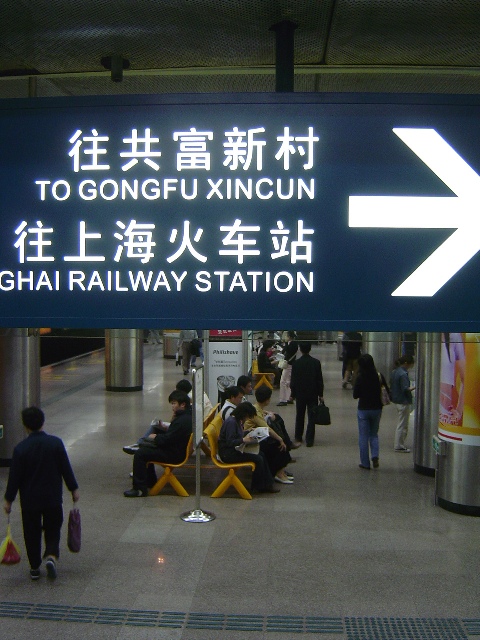
© Jian Shuo Wang
Typos
However, when I read the direction board closely, I found there are so many typos in the English spelling. I guess there are more than 50 boards in Xujiahui Station alone, but I didn’t find any board which is completely free of typos. This news is astonishing, isn’t it?
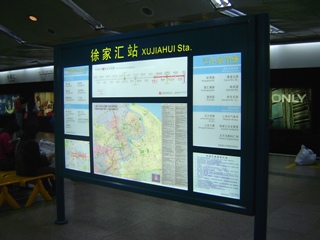
© Jian Shuo Wang
Errors
I took pictures of some of the boards, and pointed out the problems.
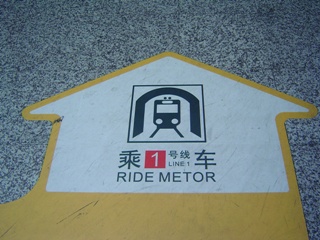
© Jian Shuo Wang
Above is the first sign of the Metro that is attached to the ground to guide people to Metro. Do they really think the direction is METOR? Also, if we take grammar into consideration, it is not right to use “Ride Metro” as a direction guide.
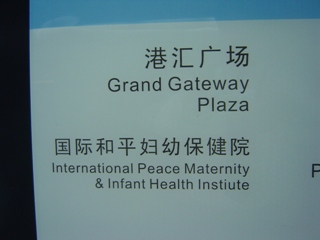
© Jian Shuo Wang
Above: Have you noticed how they spelled Institute? They used Instiute.
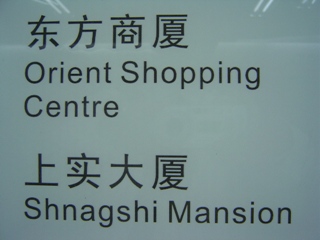
© Jian Shuo Wang
How about spell Shanghai as Shnaghai from now on, since they spelled Shangshi as Shnagshi. I saw lots of Shangshi was spelled that way. There is another board that capitalized MAN and spelled it as MANsion. Why? This is not a big problem compared to others.
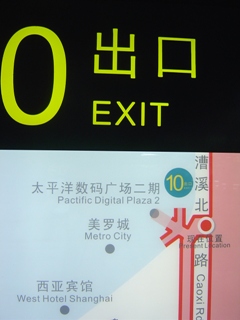
© Jian Shuo Wang
Look at the spelling of pacific. Pacticific appeared everywhere in the Metro.
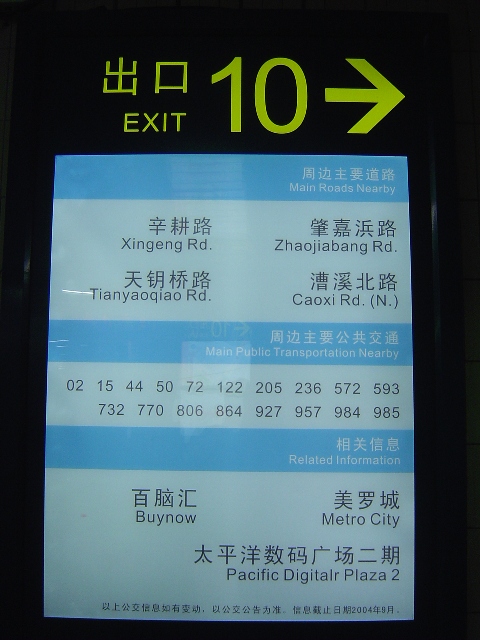
© Jian Shuo Wang
Note the Digitalr. R is not close to L on keyboard but why this R is so happy to stand with L?
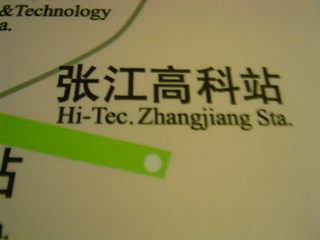
© Jian Shuo Wang. The boards on the platform.
If these signs are newly added, I found there is typo on the overhead map of all Metro train cart. Educate me if somebody has invented the abbr. Hi-tec instead of Hi-Tech.
Worried about the big project
I am very worried about the quality of the big project to replace all the signs of Metro Stations (should be more than 30 already) in the next few months. If the quality of translation remains the same, it will be one of the most embarrassing things in Shanghai’s history. I called the Metro service line, and the operator told me it is impossible to have any typo in the Metor station, because “all the design and wording have been thoroughly reviewed by experts”. She suggested me check whether my English spelling has problem because “experts’ review won’t be wrong”.
I finally convinced her there was no problem with me after I gave her the example of the spelling of Shnaghai. She seems to agree that it should not spelled that way even she does not seems to know English. She promised to ask someone to check and get back to me. BTW, if I didn’t insist to leave my phone number and my name, she may forget to collect it while promising to call me back. I checked and found they didn’t have caller ID display functions on their telephones.
I get my finger crossed to see how this can be improved. I found a good citizen inside myself this time again and will try to fix the problem on my personal effort. Does any body want to join the campaign to remove highly visible typos like this? If you want to do that, what is your suggestion besides calling them? BTW, I have called news reporter from OTV Wide Watch Program from Oriental TV already and he promised to look into it. The last time I contacted him was to report the always-red traffic light near Nandan Road.
Updated ShanghaiWiki.MetroTypos Created October 20, 2004
As Qingsi Zhu suggested, I have created a ShanghaiWiki site to allow people to collaborate and work out a better plan for Metro. Every reader can contribute to that page. Read more…
Updated Progresses October 20, 2004
I have talked with the person in charge of the Xujiahui Station and brought her to all the board and pointed the typos to her. She said “OMG!”. I guess this is a very positive move to correct these typos. The next step is to help build a corrected version of the sentences so they can use it as a reference. I will talk about this in details tomorrow.
Happy Birthday to myself. It is my 27th birthday.
I searched my old entries and saw this is the third entry with title “Happy Birthday to Me” already. The previous two are:
Update Birthday Cake October 18, 2004
Wendy bought me a very nice cake. It looks so nice. We celebrated my birthday at home.

© Jian Shuo Wang
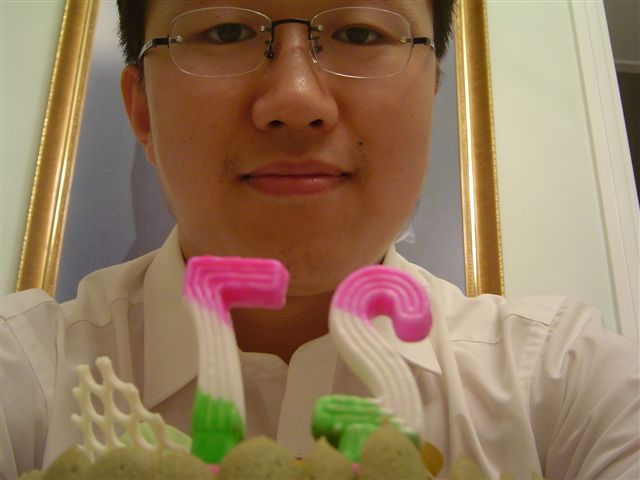
© Jian Shuo Wang
Thanks Wendy.
I apologize to Mr. Peng who wrote to me to complain that there is an error on my Shanghai Map. He searched for Zhong Shan South Road II and come to my site since mine is the first in the result. According to my map, the place is somewhere near Xi Kang Road. He took bus No 113 there only to find the road he was looking for is at the other side of the city.
I apologize for the inconvenience my map caused. I put a disclaimer on the map with red font and put it on the top of the page. It reads:
注意:本地图上的点信息由网友提供,任何人都可以添加一个点;没有人进行任何核实。它可能会帮助您尽快地在整张地图上找到您要找的点,但是一定要先在原始地图上确认再使用。Note: All the point information on this map was contributed by readers and is not verified for ts accuracy. Please reference the map image before use.
The Map
The map is built with two ideas in mind:
So I simply put the tiles of the maps and enable people to pinpoint on the city map and scroll using the errors.
Then I opened the right to add a point to anyone who has access to the page. This is built upon the Wiki concept. In the previous version, I enabled people to write description to any point and delete any point but it is not included in this version.
The point information is not accurate. I guess about half of the information is wrong. I will find a better way to control the quality to make it usable, but now, I guess I don’t have time to do it. So a disclaimer is the best solution that I can accomplish within five minutes.
English Version?
I don’t have an English version map. I know it is highly demanded and many readers asked me for that. I’m afraid I don’t have one.
Copyright
Actually, the copyright of the map is the SMI. I have contacted with them and want to make some progress to get a usage license before I use. We made appointment to meet before but didn’t find the time.
Wang Hao told me about the Google Desktop and recommend it to me before our trip to Yang Cheng Lake (my previous trip). I tried it today. After I installed it and played with it for five minutes, I said: Microsoft is in big trouble……
Google is by no doubt my most favorite company beside Microsoft. I like almost everything it gives away: The search, the Toolbar, the AdSense Program, and the Philosophy that lies behind the company (I still remember the first is, “Focus on the user and all else will follow.”). It affects many of my designs of software.
Why Google Desktop is Good
I like Google Desktop because these reasons:
1. It is small. I thought the Google’s crawling and indexing machine should be as big as a house but they managed to put it into a 400 KB. How can it be possible! It is just like the early ages of Microsoft – to create small DOS compared to other big name OS and easily load into any Personal Computer. Now there are too many legacy applications that a service pack has to be hundreds of megabytes.
2. It is fast. “Fast is better than slow” is another philosophy of Google. Before I find the search button of Outlook, the search result of all the documents on my computer has appeared. It is amazing.
3. Integration with web based Google search. I found the Desktop result in traditional Google Search as a new tab and as part of the search result. It is amazing. They really have some great ideas to make the life of people easier. When a company becomes big, the processes, the systematic thinking and the frameworks seem more important than a great idea.
Google is growing and I guess it will continue to grow with the new ideas and the philosophy unchanged.
Microsoft
I see the problems of becoming the top company and becoming a big company. The company is bigger and bigger. The expectation from the Wall Street is higher and higher, and the market to defense is increasing while the market to enter is sinking when most markets related to software has become a battle field….
However, the best thing in Microsoft is, it still keeps the basic ideas of creating software to helping people. People are working so hard to find enable people to work with more productivity. I see it in emails, in chat, in working with many people inside.
Microsoft is still a great company – look at how fast people embrace blogging, social software and new things in server area (with new servers coming out every year). I still love this company although I don’t want it to grow bigger and become an IBM one day. But it seems it will as long as its stock is still trading at NASDAQ…
Picture report again – the new Guangzhou Baiyun Airport is beautiful. It moved to a new location and was just opened. The old Baiyun Airport was abondaned.
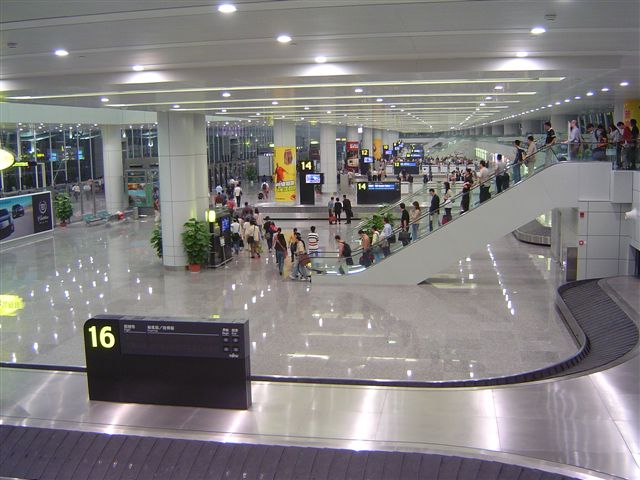
© Jian Shuo Wang
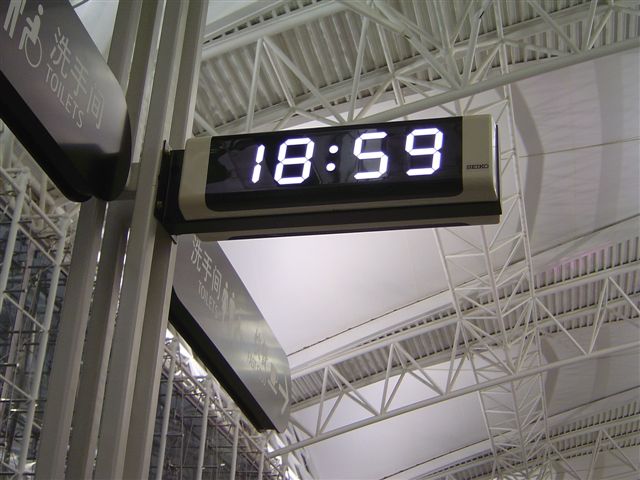
© Jian Shuo Wang
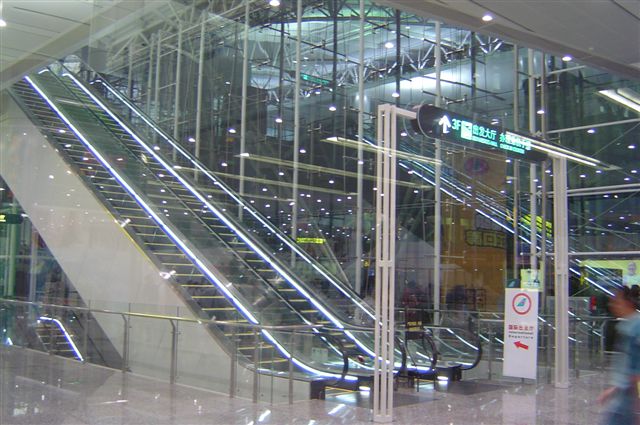
© Jian Shuo Wang
The new airport is much larger than the current Pudong Airport. The sign board of Baiyun is more clear and bright than those in Pudong. When I arrived at Pudong Airport at 5:30 PM, I saw the construction of the second run way and the second terminal is under construction. Within three years, the already large Pudong Airport will double in size and I hope the traffic will double too with its expansion.
I am experiencing bandwidth crisis. The 80G of bandwidth included in the IPowerWeb package is approaching to its limit. See the traffic increase in my previous months.
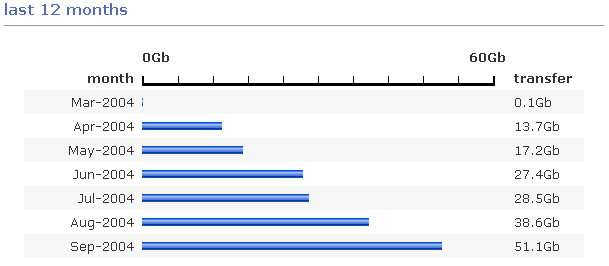
Image in courtesy of IpowerWeb
The bandwidth of this site for each month keeps increasing. I am not clear why my site was shut down even when my last month bandwidth 51G appears to be bigger than the limitation of 40G. According to the report, much more than 50% (23G) of bandwidth has been used.
My site is experiencing bandwidth crisis!
If this problem is not fixed, my site may turn out to be a blank page with a note like “The site has been shutdown due to exceeding its bandwidth limit.
My Solution
After reviewing the web, I found the most bandwidth assumption are pictures since I don’t have file download. The pictures are mainly distributed to three locations:
It appears to me by removing the pictures of maps to a new location is most effective way to reduce the bandwidth consumption. I did. I moved the files to bbs.wangjianshuo.com which is on another server with separate calculation of the 40GB.
When this does not help in the following months, I will also consider to move Photo even pictures in individual blog entries. If I only store pure HTML or Text file on this server, I can handle the huge demand everyday.
Cool URIs don’t change
Tim told us Cool URIs don’t change. It is true. So I made the commitment that I will try to keep my link work and don’t change any URI I published.
So, if I want to put a file to another server, instead of changing the URL and all content referring to it, I will REDIRECT to keep the original URL. Here the steps of what I am going to do.
Redirect
Aparch has a great feature – I guess in IIS we should add this – to use plain text file to control how the server handle URI. I will turn the RewriteEngine on and redirect all request to http://home.wangjianshuo.com/archives/2002, http://home.wangjianshuo.com/archives/2003 to http://bbs.wangjianshuo.com/archives/2002 and http://bbs.wangjianshuo.com/archives/2003. So the files are actually transferred from the new server while still keep the original URL. This document helps.
I will do the redirect later.
P.S. This entry was created at night of Oct 17. I put it on Oct 14 since i didn’t created an entry that day so I make it up by putting an entry that is not time sensitive. Don’t get surprised if you see it and start to wonder why you “missed” it.
I saw these three traditional Chinese statue at a lot of places in Guangzhou. They are called the Star of Happiness, Star of Wealth and Star of Long Life

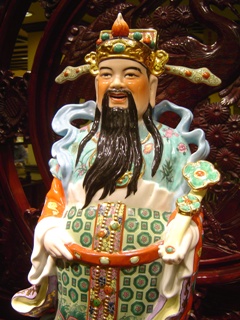
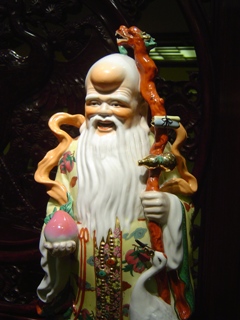
© Jian Shuo Wang. Taken at the lobby of the China Hotel by Marriot in Guangzhou.
Wendy has been ill for some days. She caught cold and didn’t show any sign of recover after the injection. I hope the statues bring some good luck to her. I have my finger crossed for her recovery soon.
It is my first time to take a ride of the Maglev train. It is also the first time I was able to choose a flight that departs before the Maglev closes (17:30).
The experience is quite impressive. When the train reaches speed higher of 300 km/h, the image out of the window, especially the cars on the nearby A1 Highway become a little bit blur and my eyes cannot catch them. It is absolutely impossible to recognize how many people on board on each car. It is quite interesting visual experience.
The highest speed during the trip. It lasted for less than one minutes and went back to 430 km/h, 429 km/h….
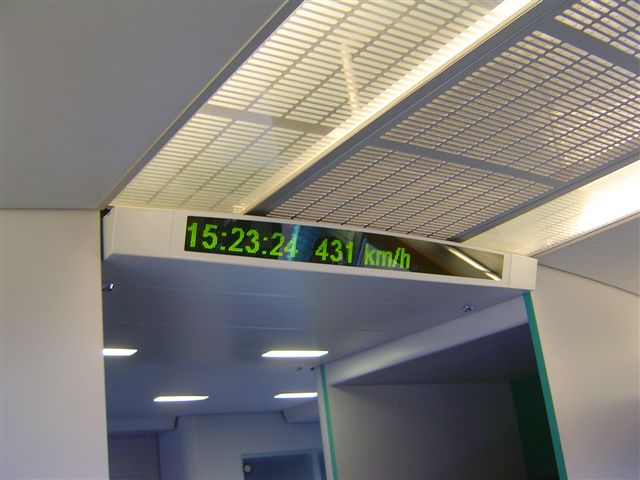
© Jian Shuo Wang
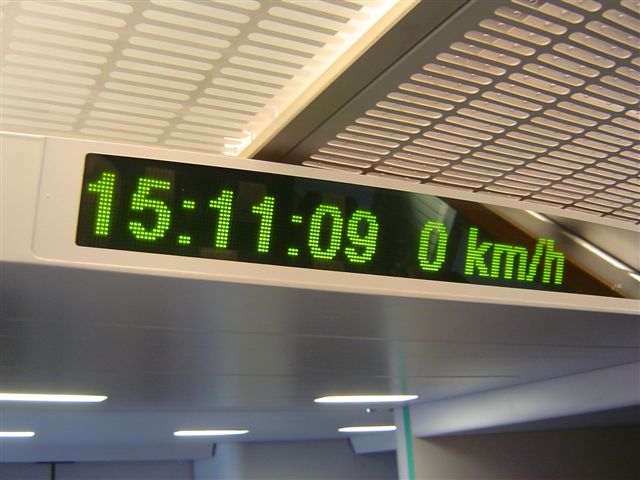
© Jian Shuo Wang
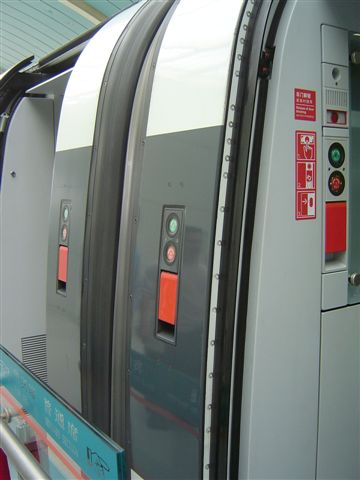
© Jian Shuo Wang
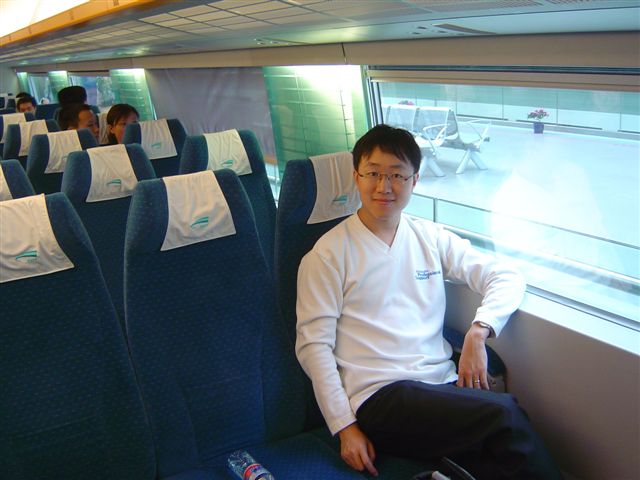
© Jian Shuo Wang
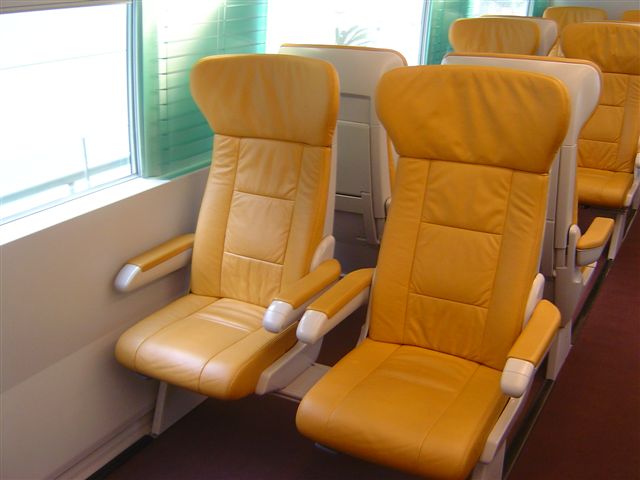
© Jian Shuo Wang
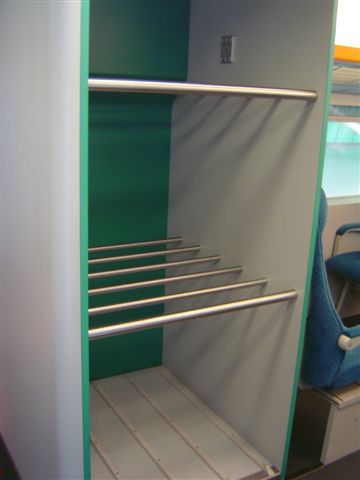
© Jian Shuo Wang

© Jian Shuo Wang
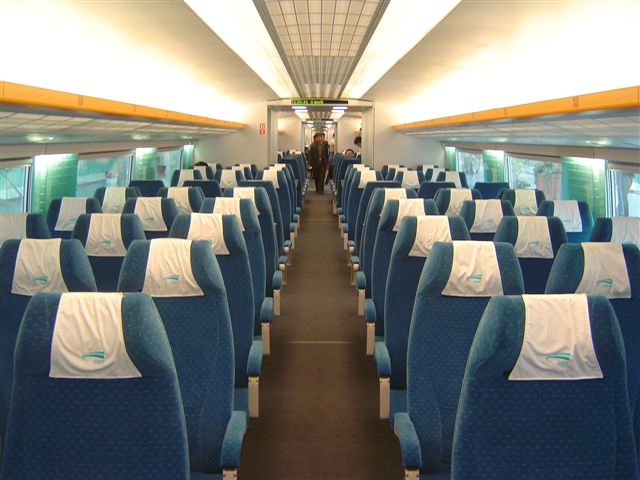
© Jian Shuo Wang

© Jian Shuo Wang
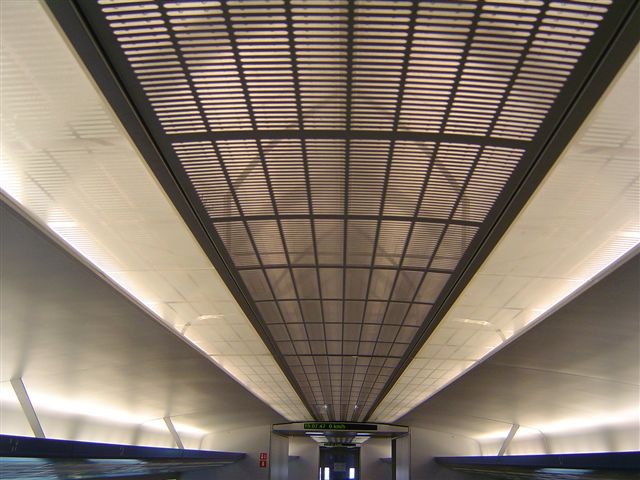
© Jian Shuo Wang
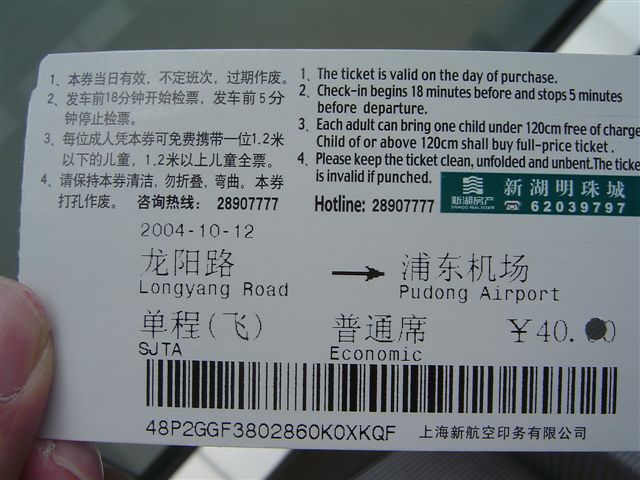
© Jian Shuo Wang
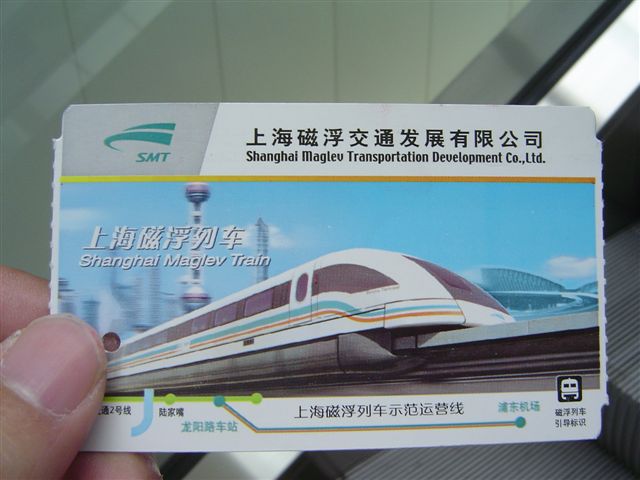
© Jian Shuo Wang
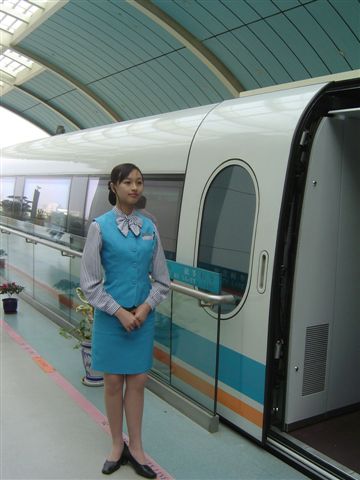
© Jian Shuo Wang
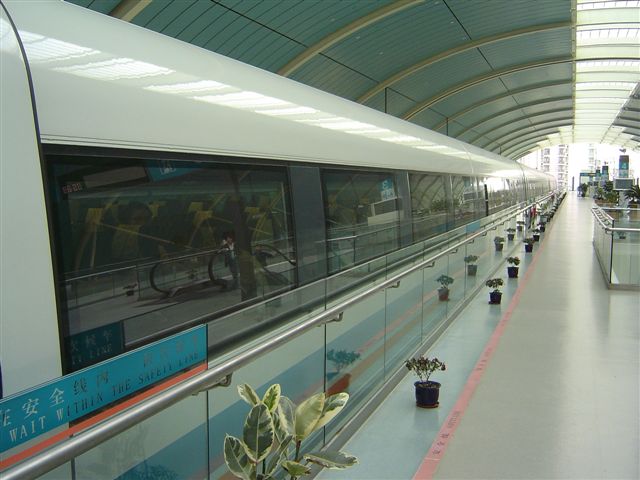
© Jian Shuo Wang
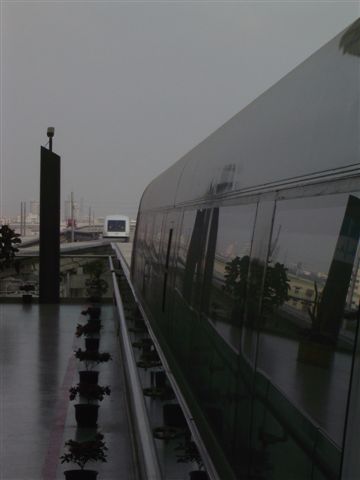
© Jian Shuo Wang
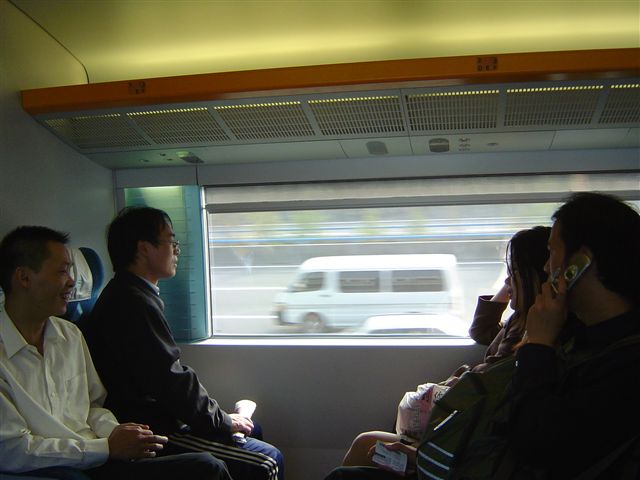
© Jian Shuo Wang
I suddenly found I didn’t take a look of my own life for quite some time when I read Wendy’s new blog entry. It is a very nice summary. Just listened to the Shanghai Radio Station Traffic Channel at 105.7 and Yangyang was broadcasting, and I found she is quite interesting to share her personal travel plan to Tibet before she went there and get back to be the host of the program after the long vacation. She mentioned about her trip in her program and I feel very nice for this kind of personal feeling. It seems she is broadcasting her blog in addition to the traditional traffic condition broadcasting. It is interesting.
Recently, I often update blog between 0:00 AM – 1:00 AM, even later. To be honest, I changed the time of these post a little bit earlier so the post still fall into the day they should belong to. There are too many things to do and I often quote the Happiness Index survey in which Shanghai is the Second Unhappiest City. I said “Want to know the reason why people in Shanghai are unhappy? Look at me!”. I was kidding. To choose to be busy is different than be chosen to be busy, and even better than having nothing to do….
Recently, I work at a customer site near Xintiandi (to be professional, I won’t disclose the name publicly, and don’t ask. :-D). I join the group to drive to Metro Station and take Metro. You can call it Park and Go. The interesting thing is, I drive from Pudong to Xujiahui Station and park my car at the underground parking lot in Metro City and then take Metro Line #1 to South Huangpi Road Station. At night, I take Metro to Xujiahui to pick up the car, along with Wendy and drive back to Pudong. Wow. I guess not many people in Shanghai will do this.
If you know a little bit idea of the map of Shanghai, you should know how crazy it is. Actually, I am driving from the east-most part of the city to the west side of the city, park it at the busiest commercial center and take Metro to another. The reason I didn’t drive to Xintiandi is, the parking fee is really high and I have decided never drive to Huangpu, and Luwan district at rush hours. It is a waste of time, gas, and good mood.
Tomorrow, I will fly to Guangzhou for training and get back on Friday.